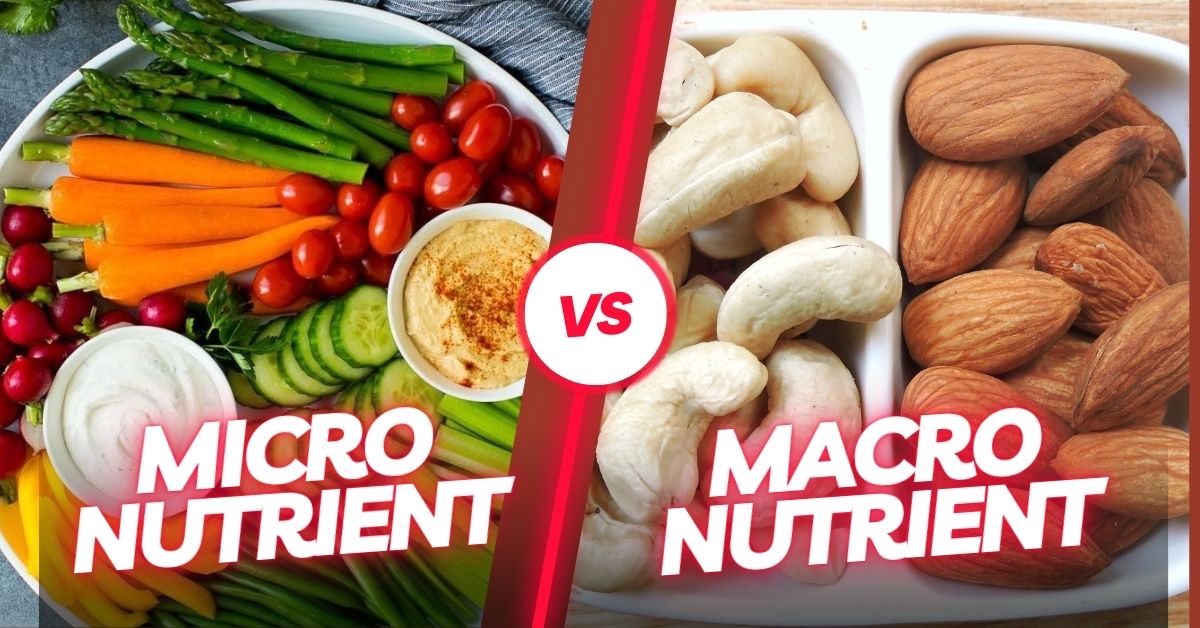Table of Contents
ToggleIntroduction to Nutrients:
In this article, you will learn about Macro vs Micro Nutrients. So, read the article to gain knowledge and share it with friends. Let’s get started.
Micronutrients in the body:
Carbohydrates: Carbohydrates are the main fuel source for the body, especially the brain and muscles, during periods of active work/loading. They occur in grains, fruits, vegetables, and pulses.
Proteins: Required for muscle growth or tissue repair. They are present in meat, fish, eggs, and pulses.
Fats: All are good and are an alternative energy source. They also assist in the absorption of fat-soluble vitamins and the protection of soft body structures. Sources of good fats include avocados, nuts, seeds, and fish.
Energy effects from the intake of macronutrients:
Carbohydrates, proteins, and fats contain energy in varying degrees. Among many calories, carbohydrates are perhaps the least dense energy substrate as they can be easily catabolized quickly to release energy. Proteins are generally not used as a primary energy source, although they have maintenance energy in sustaining energy, for example, by balancing blood response. Fats are the densest energy-giving foods and, therefore, the most reliable regarding energy reserves as they support endurance exercises. The ratio among the macronutrients determines the feeling of energy and concentration throughout the day.
Daily Macronutrient Requirements:
While the daily requirement of these nutrients varies from person to person, some general factors include age, sex, physical activity, and health. A rough estimate suggests that carbohydrates should provide 45-65% of the daily calories; protein and muscle 10-35%; and fats should be limited to around 20-35%. It is important to get the correct blend to avoid fatigue and stimulate muscular development and health.
Understanding Micronutrients:
What Are Micronutrients?
Magno nutrients are needed in bulky quantities, while micronutrients are in minute amounts. These include vitamins and minerals, crucial in performing duties like building and regulating the immune system, bone health, metabolism, etc. Ironically, even though they are needed in minute quantities, none of these micronutrients will affect one’s health.
The Importance of Vitamins:
Vitamins are chemical compounds that the body cannot manufacture enough to meet the body’s internal requirements. They play a role in synthesizing health-promoting, energy storage, and blood-clotting chemicals. For instance, vitamin C contributes to immune protection, while Vitamin D measures calcium and is good for the bone.
Vitamins fall into two categories: water-soluble vitamins such as Vitamin C and the B group vitamins, and fat-soluble vitamins such as A, D, E, and K. Water-soluble vitamins need to be taken in regular intervals, while fat-soluble vitamins are adipose and liver-tissue soluble vitamins which last longer within the body.
Isolation of Minerals & Their Contribution in Health:
Minerals are inorganic ions sourced from the soil, which some plants absorb or some animals ingest. Such policemen include calcium, magnesium, potassium, and iron. As the minerals remain in the body’s features, they aid in beneficial actions: potassium regulates the cardiovascular system, calcium enables bone formation, and iron oxygen transportation capacity.
This also caters to control over many other bodily activities, including the level of body fluids, conduction of impulses, and bone formation.
How Micronutrients Aid Immune Functioning:
Particularly, vitamins A, C, and E, as well as minerals zinc and selenium, are some of the micronutrients that play an important role in maintaining and improving immune defenses. These nutrients help the body defend against infections, repair damaged tissues, and maintain health. If a person lacks one of the important micronutrients, the immune system will likely become weak, and illnesses will occur.
Macro vs. Micro Nutrients: The Differences:
A Comparative Analysis of Macro and Micro Nutrients:
Although macro- and micronutrients are essential components of human health, their roles are distinct. The most prominent distinguishing factor is the amount in which they are required. The macronutrient is consumed more than micronutrients and is responsible for providing energy utilized in performing daily actions, growth, and repairing damaged tissues. Daily, however, essential micronutrients are needed in smaller volumes, but they are noways less significant. They keep our body systems running optimally – energy manufacture to body immunity.
Macronutrients alone are the active contributors to the calorie intake, which can be done without any expenditure of macro calories. Micronutrients are not calorie contributors but genetic factors that enhance various biochemical reactions aimed at consuming these calories.
Why Both Macro and Micro Nutrients Are Essential:

Macro and micronutrients act complementary when it comes to sustaining health. Even though carbohydrates, proteins, and fats are the energy, growth, and repair building blocks for our bodies, vitamins and minerals work as co-enzymes for exploiting the macronutrients. Thus, prime examples of metabolism deficiency disorders, energy production, and overall body health are secondary inefficiencies caused by a lack of micronutrients that can utilize macronutrients.
It can be shown that the macronutrients bestowed on us help provide energy. Still, as vitamins and minerals are deficient in abundance, the body might find it difficult to utilize them in useful forms. Take, for instance, how Vitamin B is effective in promoting carbohydrate metabolism or how Vitamin D enhances the body’s ability to assimilate calcium into the bones. When these nutrients are unavailable, we are not at our very best. This shows how macro and micronutrients are related and dependent.
Both types are required since they involve many different but equally important biological functions. An imbalance or deficiency in either can lead to adverse health effects such as lethargy, increased susceptibility to infections, poor bone density, and defects in cognitive abilities. Therefore, one must understand the importance of taking the right proportions of macro and micronutrients as it relates to health.
Sources of Macronutrients:
Whole Foods Rich in Macronutrients:
Adhering to an optimal diet comprised of whole, unrefined foodstuffs ensures that one is attaining the right macronutrients. Of the various foods given below, which one is a starch?
Carbohydrates: Carbohydrate sources are predominantly vegetable-based. Complex carbohydrates are abundant in whole foods such as brown rice, oats, and quinoa. Most people include fruits and vegetables in their diet, which also serve as carbohydrates and fiber that helps with digestion.


Proteins: In this world, one can obtain protein from animal and plant sources. Chicken, turkey, or fish are highly lean meats, and from plant sources, legumes like beans and lentils, nuts, and tofu can also be consumed as a daily protein diet.
Fats: Healthy fats, in this case, refer to fats obtained from avocados and olive oil and fatty fish like salmon. These foods are rich in omega three and omega six, which are characteristic of brain nutrients and have inflammation-reducing properties.
Balancing these food sources is indeed important as it will help meet daily energy intake and promote muscle mass, and other important bodily processes like hormone production will be taken care of.
Source Micronutrients include:
Micronutrient foods include:
In order to do so and to get enough vitamins and minerals, simple vitamin complex one needs to nourish the body with various nutritious foods. These are several sources of micronutrients:
Vitamins:
Vitamin C is important for immunity and skin restoration and is generally found in citrus fruits and vegetables like strawberries, bell peppers, and broccoli dust.
o Vitamin A – Eye health and immunity, found in carrots, sweet potatoes, and dark leafy greens.
o Vitamins B – Whole grains, meat, and legumes are all rich in B vitamins that are important in energy metabolism and brain support.
Minerals include:
o Calcium: Intake of dairy products such as milk, cheese, and yogurt are essential sources of calcium for maintaining healthy bones and teeth. Iron: Food items like red meat, lentils, and spinach should offer iron, which is important in transporting oxygen in the blood. Magnesium: A lot of magnesium is found in nuts, seeds, and green vegetables, and its function is to help the working of muscles as well as the transmission of nerve impulses.
From various fruits, vegetables, grains, and proteins incorporated into your diet, you would certainly provide both micro and macronutrients vital in maintaining the body’s optimal functioning.
How to Balance Macro and Micro Nutrients:
Finding the Right Proportion of Nutrients:
There is more to balancing macro and micronutrients than just eating more; it concerns what one eats. There lies the trick in a well-structured, wholesome, and nutritious diet that also varies from person to person about their age, lifestyle, and health condition. Athletes would require more proteins for muscle building and muscle repairs, or those who are anemic would eat an iron-enriched diet like dark leafy greens and red meats.
Next, some practical advice for achieving the ideal ratio between macro and micronutrients is offered: Focus on whole foods: Process foods tend to be deficient in micro-nutrients and unhealthy because they are high in fats, sugars, and empty calories. Turn to fresh and whole foods which are nutrient-dense.
Incorporate variety: Consuming various fruits and vegetables, whole grains, and proteins will also help obtain multiple vitamins and minerals. For example, leafy greens are rich in vitamins and calcium, whereas dairy products are rich in calcium and Vitamin D.
Watch portion sizes: The same applies to incorporating macronutrients into your diet; moderation is the ultimate answer. Excess carbohydrates or excess fats will result in weight gain, while protein deprivation will stifle recovery and muscle development.
While maintaining the correct proportions of macronutrients and micronutrients does a lot of good in energizing your system, it also safeguards you from ailments and promotes your general health.
Common Deficiencies and Their Effects:
Macronutrient Deficiencies: Symptoms and Remedies:
Macronutrient deficiencies are very specific and, if not addressed, can lead to health complications. For instance, being deprived of carbohydrates may tire you since the body lacks sufficient glucose to generate energy. Likewise, the absence of protein is characterized by loss of muscle mass, essential body processes that take longer to heal, and a weak immune defense. Without adequate healthy dietary coverage, impairment of brain activity will result in dry skin and be a higher chance of atherosclerosis.
Solutions: If deficient in any of the four macronutrients, revise what you eat. Turn to complex carbohydrates like whole grains, discover and use any pulses, focus on lean meat, and include healthy fats like those from nuts, seeds, and avocados.
Micronutrient Deficiencies: Things I Could Have Shared:
Micronutrient deficiencies are less conspicuous but are not without their consequences, especially over time. A classic example is the absence of vitamin D, Which leads to bone weakness and a high chance of osteoporosis. Iron deficiency is a leading nutrient deficiency across the globe, and its side effects include anemia, which in turn causes tiredness and lethargy. There are also inappropriate levels of vitamin B12, and these, over time, may result in the deterioration of nerves and cognitive abilities.
Solutions: Include foods that are rich in nutrients in your meals. For instance, if you are anemic, increase the consumption of red meat or beans. If you have a vitamin D deficiency, think about eating fortified foods or consuming supplements, especially if you are not exposed to much sunlight.
Conclusion:
It is important to ensure a balance of both the macro and micronutrients for an optimal healthy life. Macronutrients are the sources of energy and building materials for our bodies, while micronutrients are responsible for the biochemical activities that ensure normal functioning. Both have synergistic effects in fuelling the body, fortifying the immune response, and integrity of the organs. Achieving the correct proportions of these nutrients will put you on the road towards health and well-being in the long term.
Can You Get All Nutrients from Supplements?
While dietitians and nutritionists are strong proponents of supplements for those persons who follow a particular diet due to culture, beliefs, or health conditions, it is acknowledged that they should not replace eating healthy substantive foods because that is how nutrition should be done. Whole foods make up for different nutrients and fibers, which every supplement can’t provide. Nonetheless, supplements on-fallowed within a physician’s direction may be imperative for some people with certain medical conditions or dietary limitations
What Might Occur When You Consume Too Much of Macronutrients?
Overconsumption of calories and, more so, carbohydrates and fats usually lead to obesity, an increase in body fat storage, as well as diabetes and other metabolic disorders. One has to be careful not to eat more than what is needed and take the correct portion sizes of the available foods.
How Much Of The Micronutrients Is Sufficient?
Indicators that show an adequate supply of micronutrients in the body are a strong immune system, good skin, and energetic vitality. Testing blood may also help because some vitamins and minerals can be measured to justify whether one’s needs are met.
Is it possible to meet all the dietary recommendations while still consuming too many micronutrients?
Yes, in most cases, especially with the usage of supplements, consuming higher levels of some micronutrients prudently is quite common, and toxicity eventually occurs. For example, overconsumption of Vitamin A should be avoided as it causes liver toxicity, and excessive iron intake leads to gastrointestinal disturbance, among other harmful effects. It is also encouraged that people do not take more than the recommendations set by the.











